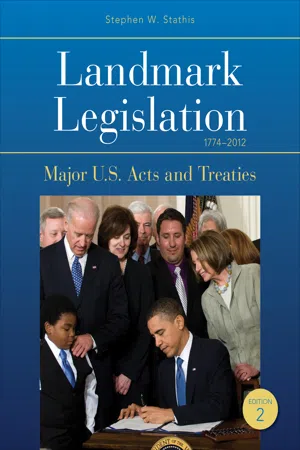Politics & International Relations
Second Continental Congress
The Second Continental Congress was a meeting of delegates from the Thirteen Colonies in America during the early stages of the American Revolutionary War. It convened in 1775 and played a crucial role in organizing the Continental Army, appointing George Washington as its commander, and ultimately declaring independence from Great Britain in 1776. The Congress served as the de facto government of the colonies during this period.
Written by Perlego with AI-assistance
Related key terms
1 Key excerpts on "Second Continental Congress"
- eBook - ePub
Landmark Legislation 1774-2012
Major U.S. Acts and Treaties
- Stephen W. Stathis(Author)
- 2014(Publication Date)
- CQ Press(Publisher)
Continental Congress September 5, 1774, to March 2, 1781 United States in Congress Assembled March 2, 1781, to October 10, 1788 First Continental Congress—September 5, 1774, to October 26, 1774 Second Continental Congress—May 10, 1775, to March 2, 1781 United States in Congress Assembled—March 2, 1781, to October 10, 1788Historical BackgroundMost of the delegates who assembled in Philadelphia, Pennsylvania, on September 5, 1774, for the First Continental Congress were instructed to focus on the redress of specific grievances against the Crown. As representatives of Great Britain’s North American colonies, most thought that they could quickly “reestablish satisfactory, if not harmonious, relations with England.” The delegates “were established social, economic, and political leaders in their home colonies, and most had served in colonial legislatures that had struggled successfully to overturn earlier programs and policies of the king and Parliament. Most assumed their earlier experiences of successful conflict resolution within the existing imperial structure would be repeated.”1 The colonies had balked for more than a decade at policies designed to reduce British war debt, cover the expenses of an expanding empire, and “rationalize” the historically loose and ad hoc relationship between Britain and her North American colonies. The purpose of the Philadelphia assemblage was neither revolution nor independence from England.The need, however, for an ongoing representative assembly quickly became clear. Over the next fifteen years, Congress (as the First Continental Congress, 1774; the Second Continental Congress, 1775–1781; and the United States in Congress Assembled, 1781–1788) would serve as the sole organ of American government. Congress was responsible for setting war aims, organizing and provisioning the army and navy, conducting foreign relations, and settling, when possible, squabbles between states. While victory in the American Revolution cannot be properly attributed to Congress, its contributions were indispensable. It articulated, nurtured, and sustained committed patriots, who were often a minority; it supported the armies, however unevenly; and it bound the states, albeit loosely.
Learn about this page
Index pages curate the most relevant extracts from our library of academic textbooks. They’ve been created using an in-house natural language model (NLM), each adding context and meaning to key research topics.
